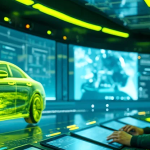Every vehicle has a story to tell. Behind the moving machine that we see, there is a journey to arrive at the selling point or the door of your house. This journey is increasingly complex, and AI plays a key role in making it more disruptive, creating new business models and exciting ways to connect with the customer.
Artificial intelligence has the power to reshape the automotive sector like never before. The global automotive artificial intelligence market anticipates robust growth at a compound annual growth rate (CAGR) of 29.2%. It is expected to attain a valuation surpassing USD 34.40 billion during the projected period spanning from 2022 to 2030.
What are the factors influencing the growth of this market? Increased investments in research and development, government initiatives, new customer demands, the need to streamline manufacturing processes, the call for sustainability, and the objective to ensure superior customer experiences are some of the factors behind the new automotive wave.
Alliances driving AI
To navigate the AI era, alliances are proving to be critical. Some tech giants are partnering with or acquiring startups to integrate AI into their strategies. For instance, Hyundai Motor Group partnered with Tensorrent, investing $50 million to integrate AI technology into the new Hyundai, Kia, Genesis vehicles and other future mobility solutions.
Similarly, Tesla acquired the start-up DeepScale, which specializes in developing technologies for automated vehicles. The acquisition aims to help Tesla produce cars with advanced driver-assistance systems, enabling owners to rent them out on a driverless “robotaxi” platform similar to Uber.
AI in the Driver’s Seat: Use cases
At Globant, we identified three main benefits of AI in the automotive industry:
1.AI in car manufacturing. Building a vehicle is a logistical challenge. In an ecosystem composed of multiple factors, AI can bring several benefits, such as:
- Increase data visibility, allowing manufacturers to track the shipping process in real-time.
- Provide information on the array of shipping methods, enabling manufacturers to choose the one that fits their needs.
- Analyze weather patterns and driver performance to predict the best shipping route.
- Accelerate supply chain, production, and post-production with automation and intelligent robots.
- Speed up time-to-market with vehicle data in predictive modeling to regulate production according to real-time demand.
2. Optimize in-car experience. The car experience is rich and complex. It involves safety, digital assistance, in-car entertainment, autonomous driving, and monitoring.
Automotive companies are introducing ChatGPT to provide a better and more efficient driver experience. ChatGPT-like systems, like Bard, Claude, or custom models, can offer hyper-personalized in-car experiences, help drivers access manuals, search for information in routing applications, provide traffic updates in real-time, etc., all while responding to a natural language input.
- Intelligent vehicle maintenance. Just like production methods, the tools for vehicle condition analysis are evolving. Many cars are now equipped with cameras and sensors that provide a wealth of data that allow a shift from corrective to predictive maintenance.
“Artificial intelligence is not only revolutionizing the automotive sector; it is rewriting the rules of mobility, manufacturing, and driving. As algorithms empower vehicles to perceive, learn, and adapt, we are driving through the transformation of a whole industry as we enter a new age of immersive experiences, seamless connectivity, and unparalleled safety.” – Marina Saint Lary, Managing Director of Globant’s Automotive Reinvention Studio.
Globant at the forefront of mobility
Globant’s Automotive Reinvention Studio drives the automotive industry forward by helping clients embrace progressive solutions. We provide automotive companies and OEMs with software architecture, connected mobility, autonomous systems, sustainable innovation, and more.
An example of our capabilities is our work in conjunction with Nissan. The Automotive Reinvention Studio wanted to transform the digital customer experience and explore innovative business approaches through data-driven decision-making and AI technology. In line with the future outlook outlined in “Nissan 2030,” Globant created an AI-powered chatbot partnering with Google, Globant, and Nissan Canada (NCI), resulting in a new conversational experience.
Driving change forward in the Automotive Industry; read our Applied AI report
Want to explore further the AI and automotive world? Read the latest report in our Applied AI series to explore in-depth use cases, the latest advances of AI in the automotive industry, how giants like Toyota and Tesla are navigating AI waters, the future of mobility, and much more!





